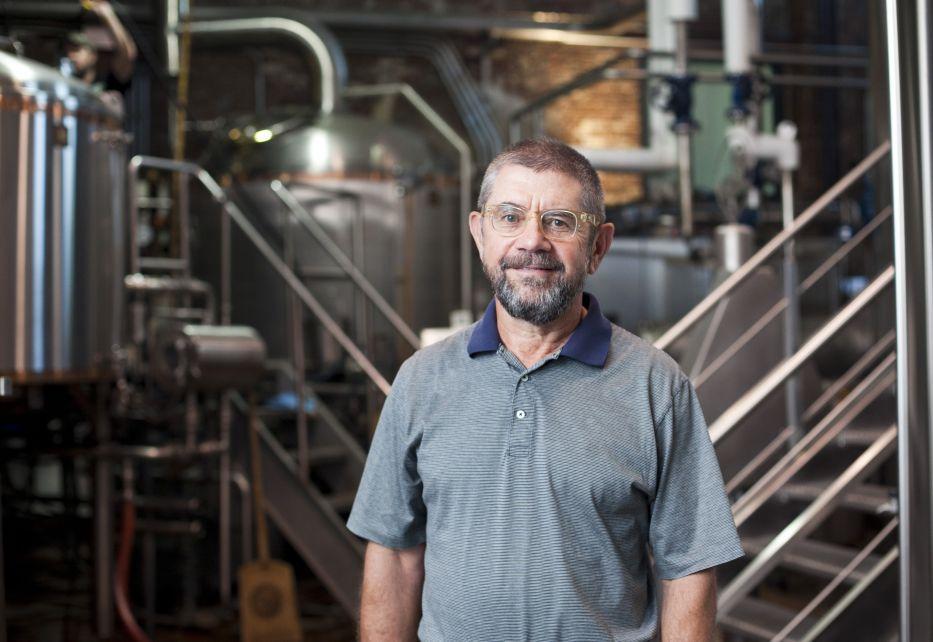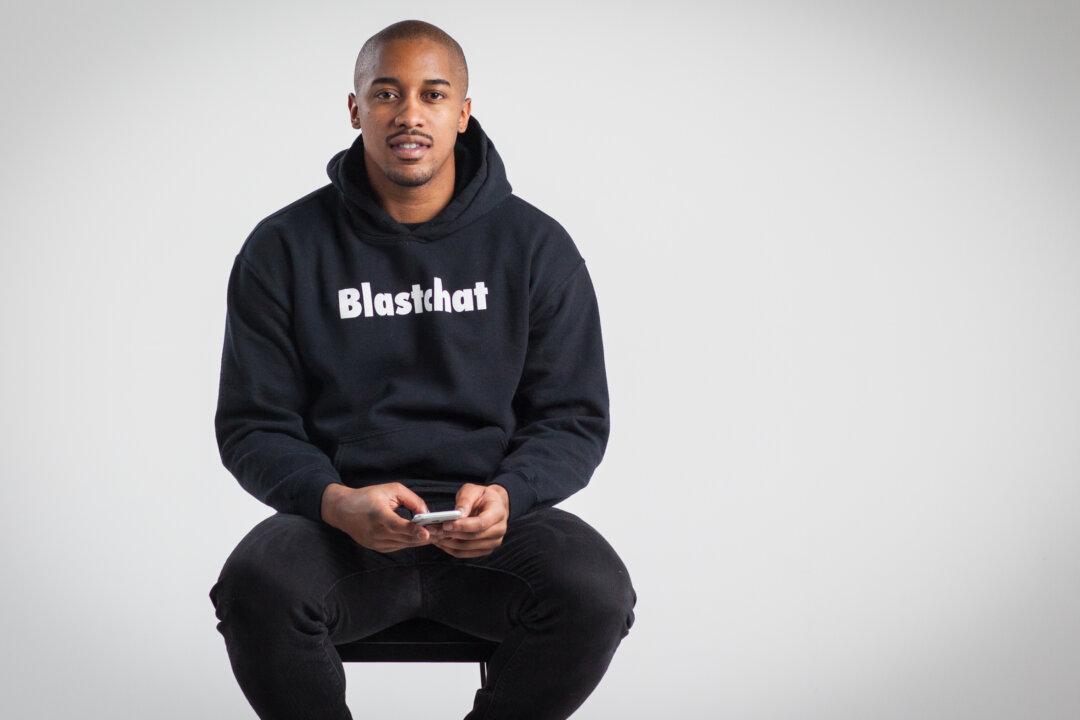NEW YORK—The Brooklyn Brewery has an interesting connection to the Middle East. A hieroglyphic mural outside the brewery states: “Beer has dispelled the illness which was in me.”
It was written in Late Egyptian and translated by Kent Weeks, a renowned Egyptologist whom Stephen Hindy interviewed in Egypt. Hindy, now Brooklyn Brewery’s president, spent almost six years as a war correspondent. Hindy also keeps a shrapnel fragment in his office. It exploded near his residence on his last day in the Middle East.
“I sometimes have dreams I’m in Beirut and they’re kidnapping people and I can’t get out,” Hindy said. His dreams are based on real events: He was abducted with the United Nations peacekeeping patrol while in Beirut. The militia tortured and killed two people who were held hostage with him.
They tortured and shot a third man; Hindy carried him out alive later that day. It was a revenge killing with a specific vendetta. They usually let journalists go, but not all are lucky.
“When I left Beirut the guy who replaced me lasted three months. Then Terry Anderson came, and he was the AP correspondent who got kidnapped and was held for seven years in Lebanon.”
Going All Out
Now head of the largest craft beer exporter in the United States, Hindy’s accomplishments in vastly different worlds come from an ability to go all out with everything he does.
He was the boy who sold the most cookies for boy scouts. He was the 12-year-old newsboy who got the most subscribers for a local paper. He won a two-week trip to Brazil for his efforts.
Hindy grew up in the small town of Middleport, Ohio. He was the first in his family to go to college.
At age 16, he and his family moved to upstate New York and he took up golf.
He won several junior golf tournaments in high school, inspiring him to study landscape architecture during his freshmen year at Cornell. He wanted to design golf courses.
“But I was a big reader,” Hindy said. “Once I got into that program I realized I couldn’t take any literature courses.”
Although his handicap was two (for non-golfers, that means he was really good), his GPA was a 1.9.
So Hindy switched to an English major. After college he taught English at a high school outside of Ithaca.
“I almost had a nervous breakdown. It’s the hardest thing I ever did,” he said.
“When I was a student I was not the best behaved student,” he said. “So when I became a teacher I had a very big conflict in my head with trying to discipline [misbehaving students] but actually liking them.”
Hence, he left to bartend at a golf course while volunteering at a weekly paper in Seneca Falls, where he was noticed by a daily newspaper in Geneva, which offered him a full-time job to cover small town and upstate politics.
After working for various local papers, Hindy caught the attention of The Associated Press (AP). It was also during a time when he and his high school sweetheart got divorced.
“That’s when it got in my head that I wanted to go to the Middle East and cover wars,” he said.
Reporting in the Middle East
Hindy was always fascinated by conflict and the Middle East. His grandfather had emigrated from Lebanon in the 1890s.
After studying Arabic for a year, he went to report on site in Beirut, Lebanon, in 1979.
When the plane neared the airport, it circled instead of landing. “There was shooting going all over the place, with anti-aircraft carriers,” Hindy recalled.
Eventually the plane landed and Hindy met the reporter he was replacing who was sitting in a Mazda that had bullet holes in its roof and front windshield.
On their way to Beirut, they pulled over to let a jeep pass; a passenger was firing a 50 caliber machine gun into the air.
“They were Palestinians pretending they could hit the Israeli jets, trying to show they’re defending Beirut,” he recalled.
A few months after his arrival, Hindy went to Iran to report on the revolution and the hostage crisis. He went on to cover the Iran–Iraq war, and massacres in the Beirut refugee camps.
Amid car bombs, shootings, and a civil war in Lebanon, Hindy missed his ex-wife. He began to write to her.
Second Time Around
She agreed to visit him and it was quiet when she came. They caught up in the Damascus mountains.
Hindy said that as he looks back, the key to making their relationship work was having respect and patience.
In 1980 they remarried in Beirut and had their first child. “When we had the baby it became very nerve wracking,” he said.
There were holes in their wooden door from machine gun fire. Rockets flew over their house into the sea. Living by the ocean was not so beautiful during war.
“There were shells landing 300 meters from the sea, that were overshooting the neighborhood where we were,” Hindy recalled. On the night of that shelling, he told his wife that she must leave with their son.
They canceled their plans to play scrabble with the New York Times correspondent and his wife.
They were arguing whether or not she should stay when a car bomb went off a block away, killing 25 people.
So his wife left with their son the next morning, three days before the airport was shelled and shut down.
In August 1981, Hindy joined his wife and son in Cairo, where his daughter was born.
In Egypt, Hindy put his new presidential security pass to use. He went to cover Egyptian President Anwar Sadat at a military parade, thinking it would be nothing more than a photo op.
As he was sitting behind Sadat, a grenade went off and a sea of bullets hit the stands. Eleven were killed, 28 were wounded. Sadat had been assassinated.
Two years after the assassination, Hindy was offered a position to report on conflict in the Philippines.
At that point, his wife “got fed up with being the wife of a war correspondent.”
“She said, ‘I’m taking the kids to the States and I hope you are coming. If not, then have a good life.’ So I went with her,” he said. “It was a big deal for me. I loved what I was doing.”
In his book, “Beer School,” Hindy wrote that he went to war zones hoping that his work could create more understanding between people.
“But the more wars I covered and the more I learned of the roots of conflicts, the less sure I became of who the good guys were—and the less sure I was of the nobility of my role,” he wrote.
Home Brew Influences
Hindy met diplomats who acquired the habit of home brewing from time spent in places like Saudi Arabia and Kuwait, where alcohol is prohibited.
Upon returning to New York, Hindy got a job as a foreign news assistant editor at Newsday.
“Being an editor was not nearly as exciting as being a foreign correspondent,” he said. I started reading about the small breweries that were starting on the West Coast.”
He began making his own beer—albeit it was disastrous at first. But he persisted and eventually became pretty good at it.
Hindy started bringing his home brewed beer to share at the office on Saturdays, when the top editors were not there.
In 1988, he persuaded his downstairs neighbor, banker Tom Potter, to start a brewery in Brooklyn with him. The rest is history.
Today, Brooklyn Brewery has become an international brand.
Mayor Michael Bloomberg said Brooklyn Brewery “symbolizes and helped create the renaissance that has taken hold in Brooklyn.”
To this day, Hindy still (secretly) gets excited when he hears someone ordering Brooklyn Lager at a restaurant.
“You remember the time when you had to buy it for people,” he said.
“There was nothing like that in the market at the time,” Hindy said. “It was darker than the mainstream beer, it has a bigger aroma. It was different in every way from other beers. We were basically building the market for craft beer at that time.”
But now, Hindy hears people ordering his beer in Sweden. He is building a brewery in Stockholm.
As the brewery nears its 25th anniversary, it is celebrating by producing beers with special labels from Brooklyn artists Hindy has met along the way.
But Hindy doesn’t personally celebrate the brewery’s anniversaries. He already has enough anniversaries to celebrate.
“Sunday was our 40th anniversary since the first marriage,” he said. “We celebrate both [marriage] anniversaries.”
Keeping Old Experiences Alive
Hindy hosts a monthly event at Brooklyn Brewery, where war journalists or photographers come to the brewery to talk about their work and experiences. The proceeds go to Reporters Instructed in Saving Colleagues (RISC).
RISC is a nonprofit that offers free first-aid training for freelance journalists who work in war zones.
His daughter, Lily Hindy, is deputy director of RISC. She has also worked for AP and lived in Egypt for a year and Syria for six months.




